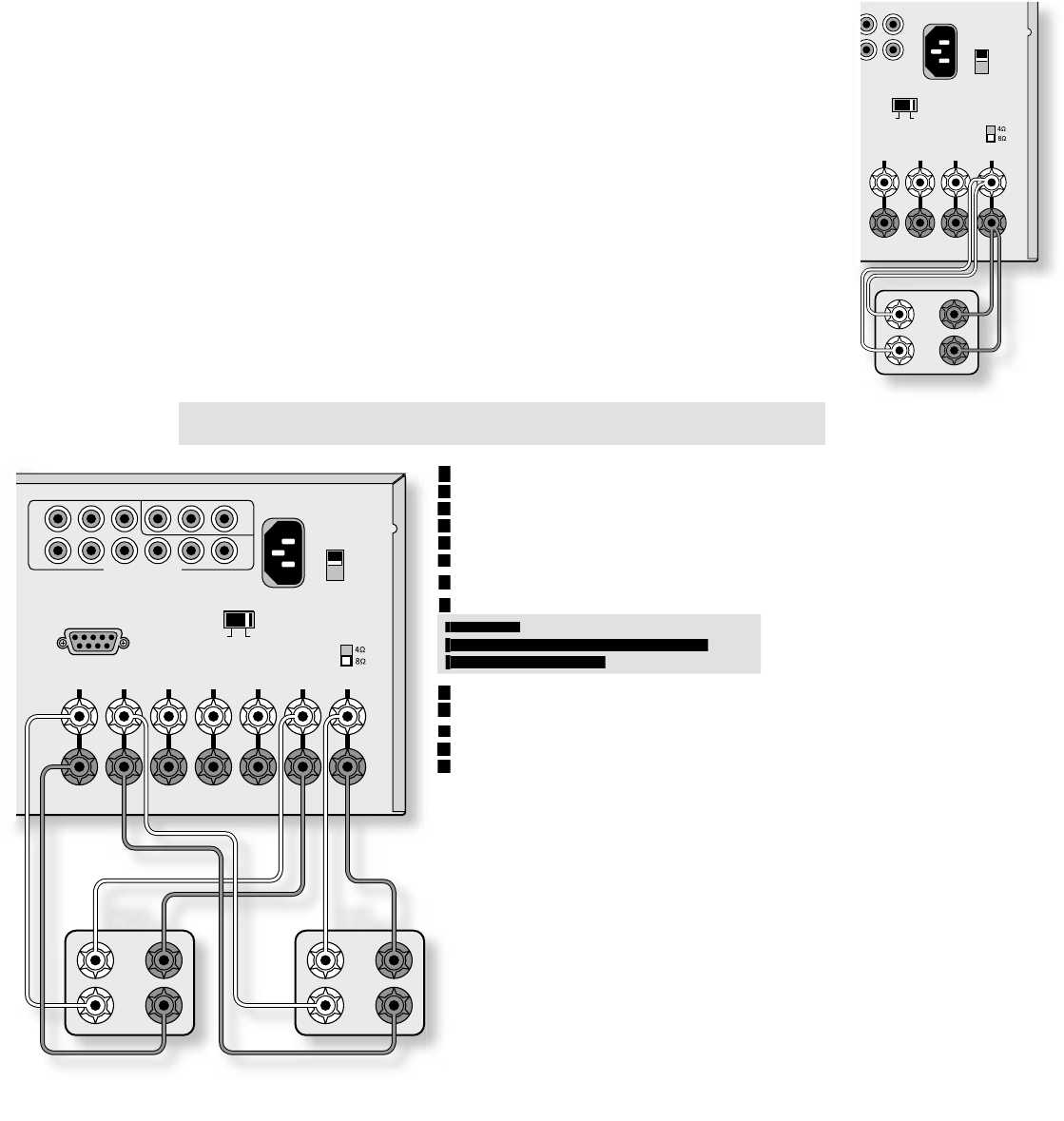
AVR250
E-28
AVR250
E-29
English
Bi-wiring and bi-amping loudspeakers
Bi-wiring improves the sound of your system as it divides the high and low frequency signal currents into
separate speaker cables. The performance of your system can be further enhanced over that achieved
with bi-wiring by extending the principle one stage further to include separate ampli cation for the low
and high frequency drive units in each loudspeaker enclosure. This is called “bi-amping”.
Before you start – important information!
1. Ensure that the volume control is set to minimum before starting these procedures.
2. Do not make any connections to your AVR250 while it is switched on or connected to the mains
supply.
3. After connecting the loudspeakers, but before switching on the AVR250, please check all
connections thoroughly, making sure bare wires or cables are not touching the AVR250 in the
wrong places (which could cause short circuits) and that you have connected positive (+) to
positive and negative (–) to negative.
Bi-wiring your loudspeakers
Bi-wiring avoids signal distortions arising from the high and low frequency currents interacting
with one another within a single cable, as occurs in conventionally wired systems.
You will need:
Speakers – with four input terminals each: the terminals will be marked HF (High Frequency
+ and –) and LF (Low Frequency + and –).
Loudspeaker cables – two pairs of cables per loudspeaker.
How to bi-wire loudspeakers
1. Remove the terminal links on the rear of your loudspeakers.
NOTE: If you do not remove the shorting links from the speaker terminals, the speakers
will still be single-wired!
2. Connect the cables as shown in the diagram, ensuring correct polarity at all times.
Bi-amping your system
Note:
In order to bi-amplify your speakers, your speakers will need to be bi-wirable (have positive and
negative terminals for both high frequency (HF) and low frequency (LF) information). If your
speakers are bi-wirable, ensure that the links between the HF and LF terminals are removed.
WARNING: This step is essential or damage to your AVR250 may result which is not covered
under warranty.
Bi-amping using the AVR250
If channels 6 and 7 of your system are not in use (i.e.,
you have a system comprised of a maximum of ve speakers,
excluding the subwoofer), these spare ampli cation channels may
be used to bi-amplify the front left and right speakers of your
system.
Follow these steps:
1. Remove the terminal links on the rear of your loudspeakers.
WARNING
: This step is essential or damage
to your AVR250 may result which is not
covered under warranty.
2. Connect the cables as shown in the diagram below, ensuring
correct polarity at all times.
3. Ensure that the
USE CHANNELS 6+7 for setting in Basic menu 6
“EX Settings” is set to
BIAMP L+R. (See page 13 for details of how
to do this.)
RS
LS
RSB
LSB
AC
INLET
OUT
SAT
GROUND
LIFT
GROUND
230
SPEAKER
IMPEDANCE
HF
LF
+ –
+
–
Bi-wiring using the
AVR250 (only one speaker
is shown, for clarity)
Bi-amping using the AVR250
If channels 6 and 7 of your system are not in use (i.e.,
you have a system comprised of a maximum of ve speakers,
excluding the subwoofer), these spare ampli cation channels may
be used to bi-amplify the front left and right speakers of your
system.
Follow these steps:
1. Remove the terminal links on the rear of your loudspeakers.
WARNING
to your AVR250 may result which is not
covered under warranty.
2. Connect the cables as shown in the diagram below, ensuring
correct polarity at all times.
3. Ensure that the
“EX Settings” is set to
to do this.)
RS232 CONTROL
FR FL CEN RS LS RSB LSB
AC
INLET
OUT
SAT
HIGH QUALITY VIDEO IN
GROUND
LIFT
GROUND
230
SPEAKER
IMPEDANCE
HF
LF
+ –
+
–
HF
LF
+ –
+
–
Bi-amping using the surround back channels of the
AVR250 (only the front left and right speakers are
shown, for clarity)


















